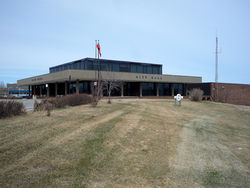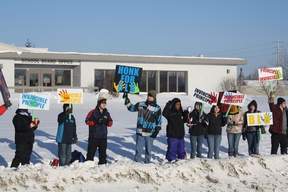Wa Ni Ska Tan, the Cree word for “wake up” or to “rise up”, an alliance of hydro-impacted communities, which is a Winnipeg-based cross-regional research alliance on the implications of hydro development for environments and indigenous communities in Northern Canada, and funded largely by a seven-year $2.5-million Social Sciences and Humanities Research Council of Canada (SSHRC) partnership grant in 2015, meets in Thompson, the heart of Northern Manitoba mega-project hydro-electric country, this coming week from May 15-17 for their annual spring research gathering.
University College of the North (UCN) has donated free-of-charge space for some of the meetings, sessions and workshops from Tuesday to Thursday on the Thompson campus, while other meetings will be held at Ma-Mow-We-Tak Friendship Centre at 4 Nelson Rd.
Sylvia McAdam, co-founder of the Idle No More movement, is scheduled to provide the keynote address.
The Idle No More campaign originated first on social media in 2012, first on Facebook and later with Twitter, when McAdam, Nina Wilson, Sheelah Mclean and Jessica Gordon expressed concern about provisions of Bill C-45, which went onto receive royal assent on Dec. 14, 2012. Idle No More began nationally on Nov. 10, 2012 at Station 20 West, a community enterprise centre serving Riversdale, King George and Pleasant Hill on the west side of Saskatoon. The early stages of the movement consisted of five rallies before a National Day of Action on Dec. 10, 2012. It was Gordon who is credited by Wilson with coming up with the name one evening in the fall of 2012 when the four women were talking and Gordon said, “We need to get off our asses and quit being idle. We can’t be idle no more.”
McAdam will also facilitate a screening at 4:30 p.m. May 16 of Dakota filmmaker Sheldon Wolfchild’s 2104 documentary, The Doctrine of Discovery: Unmasking the Domination Code, as well as a discussion and workshop.
SSHRC is the federal research funding agency that promotes and supports post-secondary–based research and research training in the humanities and social sciences. SSHRC spends more than $350 million annually, supporting more than 8,000 graduate students and nearly 14,000 researchers. The funding was awarded through SSHRC’s Partnership Grants, Partnership Development Grants, Insight Grants and Insight Development Grants programs November 2015 competition awards and publicly announced 10 months later on Sept. 9, 2016, when on Sept. 9, 2016, when SSHRC announced support for new research projects, including “Wa Ni Ska Tan: cross-regional research alliance on the implications of hydro development for environments and indigenous communities in Northern Canada” and other projects intended to “build knowledge and foster collaboration in a wide range of disciplines.”
Wa Ni Ska Tan emerged out of several meetings in Thompson in December 2014, and at Opaskwayak Cree Nation, adjacent to The Pas, in in June 2015, as well as two tours of hydro-affected communities in Northern Manitoba. Wa Ni Ska Tan is comprised of representatives from 24 Cree (Ininew/Inniniwak), Anishinaabe, and Métis communities and First Nations; 22 researchers from nine universities in Canada and the United States, as well as a number of government entities and 14 social justice and environmental non-governmental organizations (NGOs).
Ramona Neckoway, an assistant professor in Aboriginal and Northern Studies at UCN, and an active member of Wa Ni Ska Tan from Nisichawayasihk Cree Nation at Nelson House, is a PhD Candidate at the University of Manitoba whose research focuses on perspectives, experiences and implications of energy production on Cree homelands in Northern Manitoba. The working title of her thesis is “‘Where the Otters Play: ‘The Horseshoe’ to Footprint and Beyond: exploring the spatial and temporal realities of hydroelectric energy production in northern Manitoba” and focuses on a critical and lesser known voices, histories, and perspectives of hydro-affected Cree “UCN is a great venue for this year’s gathering; as a faculty member and as a person from a hydro-affected community, I am looking forward to having sessions at our new facility here in Thompson,” NationTalk, an indigenous newswire reported May 11.
A University of Manitoba-led project, “Wa Ni Ska Tan: cross-regional research alliance on the implications of hydro development for environments and indigenous communities in Northern Canada” is headed by Stéphane McLachlan, a professor in U of M’s Department of Environment and Geography. His teaching and research focus on the interface between the biological and social sciences, and his research group is particularly interested in community centred and action research with farmers, rural communities, and First Nations across western North America, Europe, and Asia.
Colin Bonnycastle, an associate professor and director of the Northern Social Work Program at the University of Manitoba at 3 Station Rd. here in Thompson, and Peter Kulchyski, from Bissett, a professor of Native Studies at the University of Manitoba in Winnipeg, who attended the government-run Frontier Collegiate residential high school in Cranberry Portage, are listed among the numerous co-applicants for McLachlan’s $2.5-million SSHRC grant.
A UCN co-applicant is Maureen Simpkins, an associate professor in Aboriginal and Northern Studies and Social Sciences. She completed her PhD in adult education in 2000 at the Ontario Institute for Studies in Education (OISE) at the University of Toronto. Simpkins’s PhD thesis is entitled, “After Delgamuukw: Aboriginal Oral Tradition as Evidence in Aboriginal Rights and Title Litigation.”
Listed as “partners” on the “Wa Ni Ska Tan: cross-regional research alliance on the implications of hydro development for environments and indigenous communities in Northern Canada” SSHRC application are the Legislative Assembly of Manitoba; LUSH Fresh Handmade Cosmetics in British Columbia; Manitoba Alternative Food Research Alliance; Manitoba Eco-Network Inc.; the Public Interest Law Centre, Social Planning Council of Winnipeg; University of Winnipeg; Tides Canada; and Manitoba Wildlands, all based in Winnipeg; McGill University in Montreal; Norway House Cree Nation; Pimicikamak Okimawin (Cross Lake Band of Indians); the Sagkeeng Alliance from Pine Falls; Swan Lake First Nation; the University of Saskatchewan at Saskatoon and St. Thomas University in Fredericton, New Brunswick; and the Tommy Thomas Memorial Health Complex in South Indian Lake.
Other partners listed on the SSHRC application include Black River First Nation Pine Falls; Boreal Action Inc. in Winnipeg; Brokenhead Ojibway Nation at Scanterbury, Manitoba; the Toronto-based Canadian Association for Food Studies; Canadian Mennonite University in Winnipeg, and the Centre for Indigenous Environmental Resources, also in Winnipeg; the Community Association of South Indian Lake; Concerned Fox Lake Grassroots Citizens in Gillam; Food Matters Manitoba, based in Winnipeg; Four Arrows Regional Health Authority Inc. in Winnipeg; along with the Green Action Centre, also in Winnipeg; Honor the Earth in Callaway, Minnesota; the Winnipeg-based Interchurch Council on Hydropower; Jerch Law in Winnipeg, where Green Party of Manitoba leader James Beddome practices law;
Justice Seekers of Nelson House; the Keewatin Public Interest Research Group in Winnipeg; the Winnipeg-based Lake Winnipeg Indigenous Collective; and Aki Energy Inc., a Winnipeg-based indigenous social enterprise.
The Interchurch Council on Hydropower is made up of official representatives of the Evangelical Lutheran Church in Canada (Manitoba/Northwestern Ontario Synod), Mennonite Central Committee Manitoba, United Church of Canada (Conference of Manitoba and Northwestern Ontario) and All Native Circle Conference, and Roman Catholic Archdiocese of Winnipeg (but not the Roman Catholic Archdiocese of Keewatin-Le Pas where many of the large hydroelectric projects are located).
A broad range of research approaches are used to achieve project outcomes, including vegetation and seed bank sampling, geomatics, mail-out questionnaires, individual and group interviews, participatory mapping, and research video. McLachlan and graduate students in his Environmental Conservation Lab actively collaborate with rural and indigenous communities and stakeholders across North America and researchers from Alberta, Ontario, Saskatchewan, and Manitoba. McLachlan’s Environmental Conservation Lab research focuses on risk analysis of genetically modified organism (GM) crops; nanotechnology, diseases such as bovine spongiform encephalopathy (BSE), commonly known as mad cow disease, bovine tuberculosis (TB); nanotechnology; environmental restoration; spatial and dispersal ecology; environmental justice and video.
Thompson is and has been a major Manitoba Hydro hydro-electric project staging area for more than 60 years, dating back to the Kelsey Generating Station being built on the upper arm of the Nelson River between 1957 and 1961 to supply the International Nickel Company’s (INCO) mining and smelting operations in the Moak Lake and Mystery Lake areas. Kelsey was also built to supply electricity to the City of Thompson. Six years after completion, the generating station was linked to the province’s electrical system.
Elsewhere along the Nelson River in Northern Manitoba, construction was completed on Kettle Generating Station in 1974; Long Spruce Generating Station in 1979; and Limestone Generating Station in 1990. Construction finished on the Wuskwatim Generating Station, located on the Burntwood River, in the Nelson House Resource Management Area, approximately 45 kilometres southwest of Thompson and 35 kilometres southeast of Nelson House, in 2012.
The Wuskwatim Generating Station journey began for the Nisichawayasihk Cree Nation when they ratified the March 1996 Comprehensive Implementation Agreement, flowing from the December 1977 Northern Flood Agreement (NFA) Implementation Agreement.
Those agreements were aimed at mitigating and compensating the indigenous Cree and Métis of Northern Manitoba, including the Nisichawayasihk Cree Nation, for the impacts of the 1977 Churchill River Diversion Project and Nelson River Diversion Project.
The project diverted water flows through a series of channels and control structures into the Nelson River. The effects of this diversion on pre-existing water levels included increased flows in the Burntwood River, a three-metre rise in the level of Southern Indian Lake and the flooding of some 809 hectares of reserve land in Nelson House, requiring remedial works and other mitigation.
The Nisichawayasihk Cree Nation used their settlement with Manitoba Hydro as a stepping-stone toward greater self-sufficiency. Wuskwatim marked the first time a First Nation and Manitoba Hydro entered into a formal partnership to develop and operate a hydro-electric project.
Manitoba Hydro provides ongoing management and operations services to the Wuskwatim Power Limited Partnership in accordance with the project development agreement signed in June 2006. Nisichawayasihk Cree Nation has the option to own up to 33 percent of the project, through the Wuskwatim Power Limited Partnership, while Manitoba Hydro owns the balance.
The Keeyask Hydropower Limited Partnership (KHLP) began construction in July 2014 on the 695-MW Keeyask Generating Station, located on the Nelson River about 30 kilometres west of Gillam and downstream from Split Lake, within the Split Lake Resource Management Area about 180 kilometres northeast of Thompson.
Manitoba Hydro and representatives from the Tataskweyak Cree Nation, War Lake First Nation, Fox Lake Cree Nation, and York Factory First Nation signed the Joint Keeyask Development Agreement at Split Lake for the Keeyask Generating Station in 2009. Under the agreement Manitoba Hydro provides administrative and management services for the project and will own at least 75 per cent of the equity. The four First Nations will collectively have the right to own up to 25 per cent of the partnership.
Construction delays have increased the cost to more than $8.7 billion and the project manager in January told provincial regulators that further delays could raise that to as much as $10.5 billion if there are additional delays until November 2022. Keeyask is officially still supposed to be completed by the summer of 2021 at a cost of $8.7 billion.
You can also follow me on Twitter at: https://twitter.com/jwbarker22


